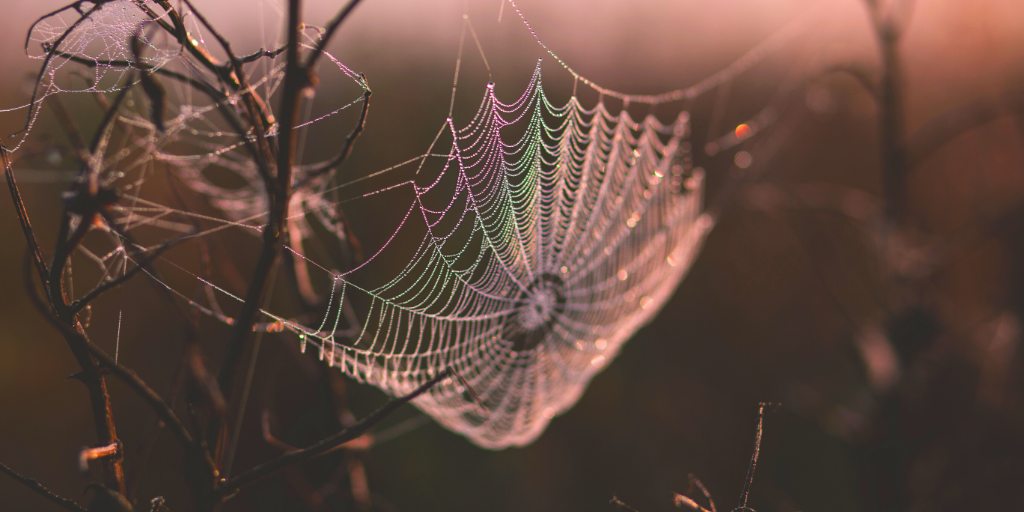
While spiders aren’t everyone’s favorite piece of creation, Kate Taliaferro reflects on how much we can learn about our life from the way they make their webs.
Our family moved to a new home this summer that sits on four acres of land. Coming from the suburbs, we have been enthralled with the amount of nature and wildlife there is to be found in the area around our home. Lately, and perhaps the proximity to Halloween is influencing this, I have been especially attentive to the spiders that seem to love our area.
Historically, spiders are actually seen in a rather negative light in the Christian tradition. Due to the near invisibility of their webs (depending on the species and how long the web has been there), spiders served as a easy parallel to the Devil laying traps for us to get caught in. While I can definitely appreciate this correlation, I have been pondering spiders more in line with Eric Carle’s The Very Busy Spider story. In that story, the spider builds a very neat and orderly web, spokes first and then the circles. It reminded me of how we ought to order our lives.

A very busy spider
I am a very busy spider. As a mom, I am quickly moving from one task to another, trying to keep all the threads in place so that our home runs smoothly and everyone is happy. Sometimes I have to stretch rather far to connect two points, much like the single spider web thread I saw the other day that was suspended more than 10 feet between a tree and a neighboring bush in our yard. If I am not careful, I will swirl around, attempting to do all the things, without enough anchor points to hold myself in place.
A traditional spider web usually depicted in movies or art has a number of long spokes, and then the spider connects each in an ever-widening circle. Imagine if only half of the spokes were there. The web would be much less stable. These spokes are a critical component to the integrity of the web. The same holds true for my life. Each person will have different “spokes” for their life’s web, but some are necessary no matter who you are.
The spokes
The most critical spoke is faith. Our belief in God has to be central to our whole life. It is, if you will, the first spoke. Without this first secure foundation, our life is off balance and off track.
A second spoke could be self-esteem and self-acceptance. Getting to know ourselves is a lifelong journey. Jesus tells us we have to love our neighbors as ourselves, which means He expects us to love ourselves well. None of us is perfect, but that doesn't mean we aren’t worthy of love, from ourselves or others. This also relates to our identity, recognizing who we are as a beloved child of God.
Using myself as the example, I would think the third spoke is community. For me, that foundational community is first the community between my husband and me, and then expanding out with our family. We heard in the Gospel reading earlier this month that God recognized it wasn’t good for Adam to be alone, so God created Eve. We are meant to be in community with others in some form or fashion. No one should be truly alone.
What would be your fourth spoke? Are you a student, so your schooling and desire for knowledge are critical elements of your life? How does your work, be it inside or outside of your home, affect your life? Do you have any hobbies you would consider foundational elements of a life well-lived?
What about negative, weak spokes, or gaps in your life where there should be something foundational that you are neglecting. Is there a relationship that needs repairing? A habit that has gotten in the way of the good things in your life? When is the last time you have been to Confession?

Emulating a spider
A final thought I had about spiders is their perseverance. Think about those fragile webs. How many spider webs have you, either on purpose or on accident, torn down? In the few months we have lived at this new house I have knocked down quite a few. But unless I also injured the spider in some way, guess what? Those webs have gone right back up again. Days of work so quickly destroyed, but the spider never stops building.
We have to be like spiders. Life doesn’t always go to plan. Sometimes, we anchor one of our spokes to an unsteady surface. Someone can come into our life and swipe our plans to the side, forcing us to start over again. Circumstances might not work out. We mess up; we sin. But like the spider, we begin again. And again. We get that first spoke in place, ideally our relationship with God, and we go from there, leaning on that sturdy foundation to begin getting things back in order.

In the end, we have to remember that no matter how perfectly crafted our life is here on earth, we are made for eternity, where some of you will probably be delighted to recall there won’t be any spiders (or at least we won’t be afraid of them any longer).
Share your thoughts with the Catholic Mom community! You'll find the comment box below the author's bio and list of recommended articles.
Copyright 2024 Kate Taliaferro
Images: Canva
About the Author

Kate Taliaferro
Kate Taliaferro is an Air Force wife and mom of 6. She has a Masters in Religious Education and tries to find God's presence in all parts of her day, be it cooking, cleaning or just the everyday ordinary. She enjoys homeschooling, stitching crafts and finding cheerios between the couch cushions. She blogs at Daily Graces.


.png?width=1806&height=731&name=CatholicMom_hcfm_logo1_pos_871c_2728c%20(002).png)
Comments